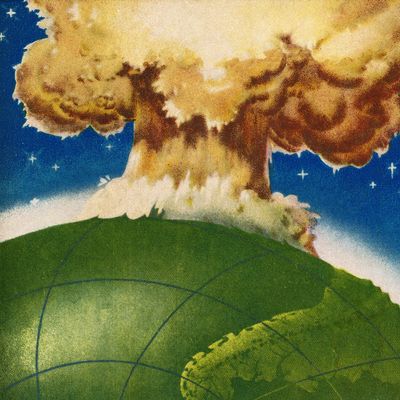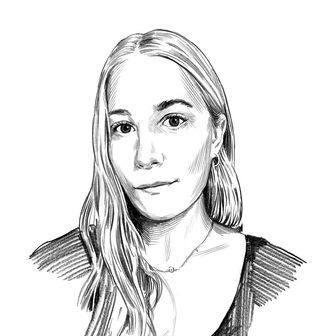
When Vladimir Putin put Russia’s nuclear defense system on heightened alert last Sunday, the term “nukes” began trending on Twitter. A congressman from Louisiana wrote an unintelligible post about “millennial leftists who never lived one day under nuclear threat” now living under a “woke sky” of our own making. “U.S. PRESIDENT BIDEN SAYS AMERICANS SHOULD NOT BE WORRIED ABOUT NUCLEAR WAR,” a Reuters correspondent tweeted, apparently not realizing the effect of all caps. Later, the NUKEMAP, a site that enables users to simulate the damage from a nuclear weapon launched on their location, went down because too many people had logged on.
For Americans who can’t remember or weren’t around for most of the Cold War, nuclear apocalypse is the premise for a disaster movie, not a threat to our real lives. But a constant slurry of updates from Russia’s war on Ukraine — both Chernobyl and a working nuclear facility were captured by Russian forces — is making that threat more concrete. By the Wednesday following Putin’s announcement, a colleague told me that she’d had a scary, albeit realistic, nightmare in which she received a news alert on her phone saying that Biden had put the United States’ nuclear defense system on heightened alert, too.
In my text messages with friends, we discussed a planned vacation at the end of the month with an eye toward survival: “If we make it,” someone said. “Haaaaaa,” I replied. Our worries were diffused between a host of other concerns (COVID, climate change; take your pick) and veiled by the various detached registers with which people who get their news on social media talk about the things that scare us. “It’s okay, ‘nukes’ isn’t even trending above all of the names of the characters from Euphoria,” I told my sister on the phone. But behind the irony, I had gnawing, earnest questions: How concerned should we really be about nuclear war right now, and how should we act? Do you pack a bag? Call your mom? Make a joke? Just log off and look away?
To get an answer, I wanted to talk to an expert not just on nuclear weapons and on U.S.-Russia relations, but on the specific subject of nuclear fear. Cynthia Lazaroff is a disarmament activist and documentarian, whose 2017 film, US-Russia Relations: The Quest for Stability, featured prominent political voices, including former Soviet president Mikhail Gorbachev, raising the alarm about the danger of nuclear weapons. In 2018, the danger suddenly became imminent for Lazaroff, who was sitting in her home in Hawaii when she got a notification that a projectile was heading for the island and she should take cover. She said good-bye to her then-partner and called her daughter in Los Angeles to tell her she loved her, waiting as long as she could to hang up. The alert, we now know, was a false alarm. But Lazaroff considers the 38 minutes when she thought it was real to be a profound gift.
“That was my awakening, in the moment where that nuclear alert became the most real for me,” Lazaroff told me on the phone from Hawaii last week. When I asked her how she feels about the looming threat to which she has dedicated her life zooming back into popular conversation, she insisted we should be concerned about nuclear weapons all the time, not just because of recent international conflict the threat had always been pressing. “Nuclear weapons, just by their existence, and by statistics — if we don’t eliminate them, as long as we have them, they’re very likely to be used by accident, miscalculation, or mistake,” she said.
As my colleague Eric Levitz laid out in a recent column, nuclear weapons are unpredictable even when they’re not wielded by an authoritarian as seemingly irrational as Putin. The early-warning systems that lock these devices into their trajectories can be accidentally triggered. The systems imposed to dismantle them can fail. Since the end of the Cold War, both the United States and Russia have ramped up their nuclear arsenals to the point where thousands of them are now ready and waiting for launch. Lazaroff said our political leaders are “sleepwalking” through an almost literal ticking time bomb.
But doesn’t my worrying about nuclear war from the security of my apartment in New York, I asked Lazaroff, reveal my very privileged position in a global hierarchy of anxieties? There were Ukrainians being shelled and shot in this conflict as we spoke; there were people suffering all over the world who were still managing to go about their days. In my city, some of my friends were working on crises with hourly dimensions: finding shelter for unhoused people, staving off our impending eviction crisis, or trying to prevent overdose deaths. “What I would say is that,” Lazaroff responded, “why do you think those people are being evicted? Why do you think that there are homeless people? Why do you think that there aren’t resources to take care of those basic needs? Why do you think there are more nuclear warheads in the United States than hospitals?”
Even having the time to contemplate such an all-encompassing threat is a blessing, I thought, but Lazaroff wasn’t interested in my taxonomy of concerns. Instead of siloing them, she wanted me to expand them into each other, to connect the issues of housing insecurity and inequality I mentioned at home with the systems that organize the whole world, specifically with the military-industrial complex her work attempts to dismantle. “Right now, the only people who are profiting from this war are the arms dealers,” she said. “We have Raytheon and Lockheed Martin boasting that their profits are higher, things are going well for them because of this conflict. We see arms being sent all over the place. We see calls for more defense spending money that’s needed. So much for human needs, the ones you say: pandemic, climate justice, racial and economic equality, health care, et cetera.” Nuclear weapons don’t take precedence over these more tangible issues; they unite them.
I realized at this point in our conversation that I had been looking for Lazaroff to say something to make me feel better, to help slow my heart rate in between using phrases like “the end of life as we know it.” I had called her to tell me how to handle fear, but I wanted her to alleviate it. I wanted her to square the bigness of what she was telling me with the smallness of my own life. I was going to go to dinner with a friend, and we would have things to discuss that felt so pressing to us — our love lives, our work — but that were grotesquely irrelevant in the context of war. “It feels crazy right now,” I told her, “to go out to dinner.”
“It should feel crazy” was her answer, in so many words. “We are being held hostage,” Lazaroff said, by nuclear weapons and the global capitalist system they uphold. Maybe the act of going out to dinner with the Doomsday Clock set 100 seconds from midnight isn’t crazy, but the dissonance between the world we have and the world we want is, and Lazaroff suggested I embrace that feeling. I understood that this was harder than being afraid. It took more effort to embrace the dire reality of our current conditions and then imagine what lies beyond them.
She did offer me one exercise to alleviate the acute anxiety of the moment: to concentrate on the world I want. “Go to the place where it’s already done,” Lazaroff suggested. “Go to the place hundreds of years into the future, where your great-great-grandchildren are on the beach, and they’re thanking you because they have clean air, they have clean water. We have to see it, even if it seems impossible.”





